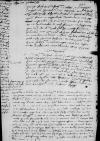List #1777
[Ioannes DANTISCUS] do Tomasz SOBOCKILöbau (Lubawa), 1537-11-16
Rękopiśmienne podstawy źródłowe:
Publikacje:
| ||||||
Tekst + aparat krytyczny + komentarzZwykły tekstTekst + komentarzTekst + aparat krytyczny
Generose Domine, amice carissime. Salutem et felicitatem.
Scripsit mihi procurator meus ex
Dat(ae) or Dat(um)⌈Dat(ae)Dat(ae) or Dat(um)⌉
ex

 BCz, 244, p. 303
BCz, 244, p. 303